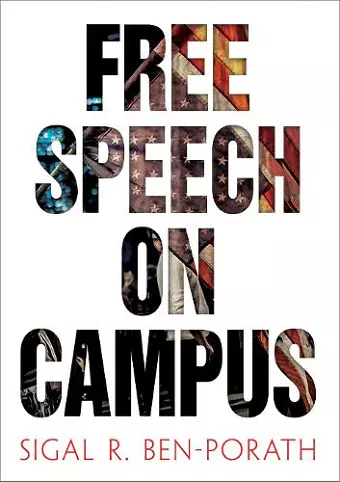Free Speech on Campus
Format:Hardback
Publisher:University of Pennsylvania Press
Published:25th Aug '17
Currently unavailable, and unfortunately no date known when it will be back

In Free Speech on Campus, political philosopher Sigal Ben-Porath offers a useful framework for thinking about free-speech controversies surrounding trigger warnings, safe spaces, and speech that verges on hate. Everyone with a stake in campus debates will find something valuable in her illuminating discussion of these critical issues.
From the University of California, Berkeley, to Middlebury College, institutions of higher learning increasingly find themselves on the front lines of cultural and political battles over free speech. Repeatedly, students, faculty, administrators, and politically polarizing invited guests square off against one another, assuming contrary positions on the limits of thought and expression, respect for differences, the boundaries of toleration, and protection from harm.
In Free Speech on Campus, political philosopher Sigal Ben-Porath examines the current state of the arguments, using real-world examples to explore the contexts in which conflicts erupt, as well as to assess the place of identity politics and concern with safety and dignity within them. She offers a useful framework for thinking about free-speech controversies both inside and outside the college classroom, shifting the focus away from disputes about legality and harm and toward democracy and inclusion. Ben-Porath provides readers with strategies to de-escalate tensions and negotiate highly charged debates surrounding trigger warnings, safe spaces, and speech that verges on hate. Everyone with a stake in campus controversies—professors, students, administrators, and informed members of the wider public—will find something valuable in Ben-Porath's illuminating discussion of these crucially important issues.
Free Speech on Campus makes a valuable contribution to a debate that has often been marred by confusion. In the campus context, Ben-Porath's argument that we may protect students from dignitary harm, but not from intellectual challenge, helps us to think clearly about the importance of not censoring speech on the basis of its intellectual content. Student activists, professors, and university administrators can all learn from reading this book. * Peter Singer, Princeton University *
What norms should govern free expression in the university? In this fine book, Ben-Porath dispels misconceptions about what is at stake in current controversies, and sets her answer in the broader context of the changing role of the university in a democratic society. Rich in examples and analysis, as well as in practical suggestions, her arguments are fair minded and important. * Debra Satz, Stanford University *
Ben-Porath has joined the debate about campus speech with a strong and persuasive argument. She is especially good when she explains, very quietly, why civility is sometimes necessary and sometimes not. * Michael Walzer, Institute for Advanced Study *
In Free Speech on Campus, Ben-Porath persuasively shows how her ideal of inclusive freedom can protect academic freedom while also supporting the equal participation of vulnerable groups in academic life. Her book is a must-read for everyone interested in debates over controversial speech on campus. * Elizabeth Anderson, University of Michigan, Ann Arbor *
Ben-Porath's Free Speech on Campus firmly sets aside the sensationalism and venom we often see in off-campus discussion of university speech, in favor of a careful defense of 'inclusive freedom.' Her argument persausively emphasizes the fundamental compatibility between universities' commitments both to open inquiry and to open participation in the community of inquiry. This is not splitting the difference, but a principled argument that inclusion doesn't require censorship, and academic freedom is a value that can be open to all on America's diversifying campuses. A wise and valuable book. * Jacob T. Levy, McGill University *
ISBN: 9780812250077
Dimensions: unknown
Weight: unknown
136 pages